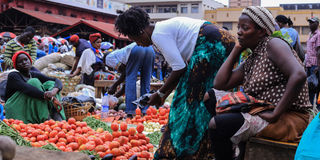Cost of living tops global risks

A woman sits in front of her tomato stall as she waits for customers at Nakasero-Market in Kampala. PHOTO/ FILE
What you need to know:
Cost of living dominates global risks in the next two years while climate action failure dominates the next decade according to World Economic Forum.
The Global Risks Report 2023 by the World Economic Forum has raised various risks which will affect countries around the world Uganda inclusive.
A risk is the chance of something happening that will have an effect on the economy and people’s lives. The level of risk reflects: the likelihood of the unwanted event or the potential consequences of the unwanted event.
The World Economic Forum states the Global risks ranked by severity over the short and long term.
The World Economic Forum points out in their latest report that cost of living dominates global risks in the next two years while climate action failure dominates the next decade.
The next decade will be characterised by environmental and societal crises, driven by underlying geopolitical and economic trends.
Cost of living
“Cost of-living crisis” is ranked as the most severe global risk over the next two years, peaking in the short term. “Biodiversity loss and ecosystem collapse” is viewed as one of the fastest deteriorating global risks over the next decade, and all six environmental risks feature in the top 10 risks over the next 10 years.
Nine risks are featured in the top 10 rankings over both the short and the long term, including “Geoeconomic confrontation” and “Erosion of social cohesion and societal polarisation”, alongside two new entrants to the top rankings: “Widespread cybercrime and cyber insecurity” and “Large-scale involuntary migration”.
Dr Saadia Zahidi, managing director of the World Economic Forum, said: “The 2023 edition of the Global Risks Report highlights the multiple areas where the world is at a critical inflection point. It is a call to action, to collectively prepare for the next crisis the world may face and, in doing so, shape a pathway to a more stable, resilient world.”
As the conflict between Russia and Ukraine approaches one year, economies and societies will not easily rebound from continued shocks.
Volatility
Dr Saadia explained that in this year’s Global Risks Perception Survey, more than four in five respondents’ anticipated consistent volatility over the next two years. The persistence of these crises is already reshaping the world that we live in, ushering in economic and technological fragmentation. A continued push for national resilience in strategic sectors will come at a cost – one that only a few economies can bear.
“Geopolitical dynamics are also creating significant headwinds for global cooperation, which often acts as a guardrail to these global risks. The 18th edition of the Global Risks Report considers this backdrop of simmering geopolitical tensions and confluence of socioeconomic risks. It identifies the most severe perceived risks to economies and societies over the next two years,” she said.
The world’s collective focus is being channeled into the “survival” of today’s crises: cost of living, social and political polarisation, food and energy supplies, tepid growth, and geopolitical confrontation, among others.
Yet much-needed attention and resources are being diverted from newly emerging or rapidly accelerating risks to natural ecosystems, human health, security, digital rights and economic stability that could become crises and catastrophes in the next decade.
She cautioned that a low-growth, low-investment and low-cooperation era further undermines resilience and the ability to manage future shocks. In recognition of growing complexity and uncertainty, the report also explores connections between these risks.
While appearing before the Committee on Finance and Economic Development on January 10 the Deputy Governor Bank of Uganda, Dr Michael Atingi-Ego the Ugandan economy remains resilient to shocks.
“However, the economy continues to suffer from adverse spillovers from the Russia-Ukraine war-induced high global commodity prices, tight global and domestic financial conditions, and adverse weather conditions. The high and persistent inflation has inevitably affected consumer and business demand and negatively affected business and consumer confidence,” he said.
Dr Atingi-Ego said in addition, the slow global growth, especially for Sub-Saharan African economies, which are the leading destinations for Uganda’s exports, has negatively affected external demand.
“Uganda’s external position weakened in the 12 months to November 2022, reflecting adverse spillover effects associated with the Russia-Ukraine conflict, particularly on the commodities terms of trade, ” he said.
Risks on the radar
In the report, the World Economic Forum explains that as an economic era ends, the next will bring more risks of stagnation, divergence and distress. The economic aftereffects of Covid-19 and the war in Ukraine have ushered in skyrocketing inflation, a rapid normalization of monetary policies and started a low-growth, low-investment era.
The report states that Governments and central banks could face stubborn inflationary pressures over the next two years, not least given the potential for a prolonged war in Ukraine, continued bottlenecks from a lingering pandemic, and economic warfare spurring supply chain decoupling. Downside risks to the economic outlook also loom large.
“A miscalibration between monetary and fiscal policies will raise the likelihood of liquidity shocks, signaling a more prolonged economic downturn and debt distress on a global scale. Continued supply-driven inflation could lead to stagflation, the socioeconomic consequences of which could be severe, given an unprecedented interaction with historically high levels of public debt,” the report reads in part.
Global economic fragmentation, geopolitical tensions and rockier restructuring could contribute to widespread debt distress in the next 10 years. Even if some economies experience a softer-than expected economic landing, the end of the low interest rate era will have significant ramifications for governments, businesses and individuals.
The report warns that the knock-on effects will be felt most acutely by the most vulnerable parts of society and already-fragile states, contributing to rising poverty, hunger, violent protests, political instability and even state collapse.




